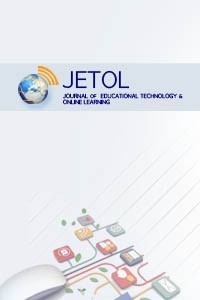The Metaverse in mathematics education: The opinions of secondary school mathematics teachers
The Metaverse in mathematics education: The opinions of secondary school mathematics teachers
___
- Aburbeian, A.M., Owda, A.Y. & Owda, M. (2022). A technology acceptance model survey of the metaverse prospects. AI, 3(2), 285–302. https://doi.org/10.3390/ai3020018
- Altıok, S. (2020). The effects of augmented reality supported symmetry teaching on the academic achievement of primary school students and student opinions. Educational Technology Theory and Practice, 10 (1) , 177-200. https://doi.org/10.17943/etku.622871
- Baltacı, A. (2017). Miles-Huberman model in qualitative data analysis. Ahi Evran University Journal of Social Sciences Institute, 3(1), 1-14.
- Boz, M.S. (2019). Evaluation of augmented reality applications in education. Ministry of National Education General Directorate of Innovation and Educational Technologies Publication , 1-46. https://yegitek.meb.gov.tr/meb_iys_dosyalar/2020_03/26132150_egitimdeartirilmisgerceklikuygulamalarinindegerlendirilmesi.pdf
- Boz, İ., & Özerbaş, M. A. (2020). Opinions of primary school teachers on their use of technology in mathematics lessons. Journal of Science Education Art and Technology,4(2), 56-66. https://dergipark.org.tr/en/pub/bestdergi/issue/54949/623636
- Cabero-Almenara, J., Barroso-Osuna, J., & Martinez-Roig, R. (2021). Mixed, augmented and virtual, reality applied to the teaching of mathematics for architects. Applied Sciences, 11(15), 7125. https://doi.org/10.3390/app11157125
- Creswell, J. W., & Clark, V. L. P. (2018). Designing and conducting mixed methods research. Ankara: Anı Publishing.
- Çelik, R. (2022). What is the metaverse? Conceptual evaluation and overview. Balkan and Near Eastern Journal of Social Sciences, 8 (1), 67-74. https://www.ibaness.org/bnejss/2022_08_01/10_Celik.pdf
- Çetin, Ö. (2019) Virtual world applications effect on student motivation in business education; 'Second Life' example[Master's thesis, Çağ University]. Council of Higher Education Türkiye Thesis Center Database (565297).
- Damar, M. (2021). Metaverse shape of your life for future: A bibliometric snapshot. Journal of Metaverse, 1 (1), 1-8. https://dergipark.org.tr/en/pub/jmv/issue/67581/1051371
- Dean, Brian. 2021. Roblox usage and growth statistics: How many people play Roblox in 2021? Backlinko. Retrieved July 6, 2022, from https://backlinko.com/roblox-users#geographic-distribution-of-roblox-users
- Díaz, J., Saldaña, C., & Avila, C. (2020). Virtual world as a resourceforhybrideducation. International Journal of Emerging Technologies in Learning (iJET), 15(15), 94-109. Retrieved July 5, 2022, from https://www.learntechlib.org/p/217986/.
- Durak, A., & KaraoğlanYılmaz, F., G. (2019). Opinions of secondary school students on educational practices of augmented reality. Bolu Abant İzzet Baysal University Faculty of Education Journal, 19 (2), 468-481. https://doi.org/10.17240/aibuefd.2019.19.46660-425148
- Göçen, A. (2022). Metaverse in the context of education. International Journal of Western Black Sea Socialand Humanities Sciences, 6(1), 98-122. https://doi.org/10.46452/baksoder.1124844
- İlic, U. (2013). Three dimensional virtual environment application in foreign language education [Master's thesis, Ege University]. Council of Higher Education Türkiye Thesis Center Database (346602).
- Kalkan, N. (2021). A compilation of the present and future of sports in the metaverse universe. Journal of National Sport Sciences, 5(2), 163-174. https://doi.org/10.30769/usbd.1027728
- Kang, Y. M. (2021). Metaverse framework and building block. Journal of the Korea Institute of Information and Communication Engineering, 25(9), 1263-1266. https://doi.org/10.6109/jkiice.2021.25.9.1263
- Kuş, O. (2021). Metaverse: Perceptions regarding opportunities and concerns in the 'digital big bang'. Intermedia International E-Journal. 8 (15), 245–266. https://doi.org/10.21645/intermedia.2021.109
- Lee, H., Woo, D., & Yu, S. (2022). Virtual realitymetaversesystemsupplementing remote educationmethods: Based on aircraft maintenancesimulation. Applied Sciences, 12(5), 2667. https://doi.org/10.3390/app12052667
- Lee, J. Y. (2021). A study on metaverse hype for sustainable growth. International Journal of Advanced Smart Convergence, 10(3), 72–80. https://doi.org/10.7236/IJASC.2021.10.3.72
- Miles, M. B., & Huberman, A. M. (1994). Qualitative data analysis: An expandedsourcebook. ThousandOaks, CA: Sage.
- Mutluoğlu, A., & Erdoğan, A. (2021). The effect of virtual manipulatives developed for 6th grade mathematics lesson on students' achievement and attitudes towards geometry. International Journal of Educational Studies in Mathematics, 8(3), 195-218. https://doi.org/10.17278/ijesim.942382
- Mystakidis, S. (2022). Metaverse. Encyclopedia, 2(1), 486-497. Retrieved June 6, 2022, from https://www.mdpi.com/1492130
- Newzoo (2022). Deep dive: Early metaverse players-data on demographics, socializing, playing, & spending. https://newzoo.com/insights/articles/deep-dive-metaverse-gamers-data-on-metaverse-demographics-socializing-playing-spending-2
- Özdemir, D., & Özçakır, B. (2019). An analysis of theeffects of augmentedrealityactivities in teachingfractions on 5th gradestudents’ mathachievementandattitudes. Adıyaman UniversityJournal of Educational Sciences, 9(1), 21-41. http://dx.doi.org/10.17984/adyuebd.495731
- Özkahveci, E., Civek, F., & Ulusoy, G. (2022). The place of metaverse (fictional universe) in the period of industry 5.0, Journal Of Social, Humanities and Administrative Sciences, 8(50):398-409. http://dx.doi.org/10.31589/JOSHAS.929
- Statista (2022). Familiarity with the metaverse according to adults in the United States as of January 2022. https://www.statista.com/statistics/1290378/unites-states-adults-familiarity-with-the-metaverse.
- Süleymanoğulları, M., Özdemir, A., Bayraktar, G., & Vural, M. (2022). Metaverse scale: Study of validity and reliability. Anatolia Sport Research, 3(1), 47-58. http://dx.doi.org/10.17984/adyuebd.495731
- Şahin, G. (2016). Using the game of the Second Life as a model for experiential learning in social studies teaching [Master'sthesis, Muğla Sıtkı Koçman University]. Council of higher education Türkiye Council of Higher Education Türkiye Thesis Center Database (428406).
- Şahin Orkunoğlu, I. F., & Çiftçi, T. E. (2022). Taxation of transactions performed in metaverse. Fiscaoeconomia, 6(2), 677-698. https://doi.org/10.25295/fsecon.1104368
- Somyürek, S. (2014). Gaining the attention of generation z in learning process: augmented reality. Educational Technology Theory And Practice, 4 (1) , 63-80 . https://doi.org/10.17943/etku.88319
- Stephenson, Neal. (1993). Snow Crash. New York: Bantam Books.
- Suh, W., & Ahn, S. (2022). Utilizing the metaverse for learner-centered constructivist education in the post-pandemic era: an analysis of elementary school students. Journal of Intelligence, 10(1). https://doi.org/10.3390/jintelligence10010017
- Şimşek, İ., Erbay, H. N., & Kirişçi, M. (2019).Teaching fractions at the 5th grade level in a three-dimensional virtual learning environment: Second life example. Journal of Ahi Evran University Kırşehir Education Faculty, 20(1), 139-154. https://doi.org/10.29299/kefad.2018.20.01.005
- Türk, G. D., Bayrakcı, S., & Akçay, E. (2022). Metaverse and self-representation. Turkish Online Journal of Design Art and Communication , 12 (2) , 316-333 . https://dergipark.org.tr/en/pub/tojdac/issue/68757/1064587
- Yıldırım A., & Şimşek, H. (2021). Qualitative research methods in the social sciences. Ankara: Seçkin Publishing.
- ISSN: 2618-6586
- Yayın Aralığı: Yılda 3 Sayı
- Başlangıç: 2017
- Yayıncı: Gürhan DURAK
An examination of opinions of teacher candidates on a course enriched through gamification
Investigation of publications on the use of technology in music education
Kübra ÖZSAT, Serdal IŞIKTAŞ, Hülya ŞENOL
Adaptation of architectural education pedagogy in addressing COVID-19 pandemic
Pooya LOTFABADİ, Soad ABOKHAMIS MOUSAVI
A Research about the opinions of pre-service Turkish teachers on the online education process
Sevim AYDIN, Emel DUMAN, Yasemin BERTİZ, Salih BİRİŞÇİ
